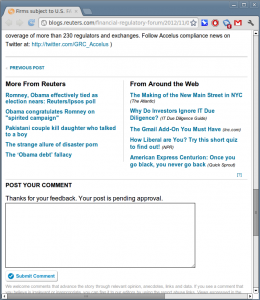US-based financial journalist Emmanuel Olaoye (@emmanuelolaoye) recently wrote a blog post for Reuters entitled “Firms subject to U.S. FATCA advised to press on with preparing despite rule delay”. This is mostly an unremarkable pastiche of quotes from Tax-Industrial Complex FATCA cheerleaders of the type with whom we’re all familiar. But in the middle, it features this howler:
The extended dates will allow firms more time to implement systems for checking hundreds of thousands of customer accounts when FATCA becomes effective, said J. Richard Harvey, a former senior advisor to IRS Commissioner Doug Shulman and now a professor at the Villanova University School of Law.
I can hardly think of a less neutral person to quote on the topic of how firms should make use of the time given to them by the latest FATCA delay, besides perhaps Carl Levin. Yet the editors over at Reuters are apparently happy with this anodyne description of Harvey which offers no hint to the reader of his conflict of interest. In reality, Harvey proudly characterises himself as a a FATCA “architect” and “insider” who flies all over the world to defend FATCA from the criticisms of ordinary people who are actually affected by it. People who are less professionally-invested in the success of FATCA have very different opinions on what firms should be doing over the course of the next year; indeed, some of them are calling for increased lobbying in order to kill the beast.
So yesterday (6 November) at around 10 AM I pointed this matter out in a comment:
J. Richard Harvey, who is quoted in the article, is not merely a “former senior advisor to IRS Commissioner Doug Shulman” but one of the architects of FATCA. Indeed he even refers to himself a “FATCA insider”. A first step towards objectivity in this article would be to make this fact clear.
More broadly, Mr. Olaoye in his capacity as a journalist should go beyond simply quoting the cheerleaders for FATCA and the compliance firms who are now doing a brisk business helping banks implement new systems to prepare for it, and include prominent voices of opposition in industry and academia such as James Jatras or Art Cockfield.
As of about 6 AM GMT on 7 November, Reuters has declined to publish my comment.





*13:00 GMT+1, don’t see your comment and don’t see why FATCA advocates need to censure it from the press at any cost.
Great wording in your comment @Eric.
The FATCANATICS are always just quoted as authoritative sources without question. I will watch for your comment, and might put up one too and see what happens.
Called in again to talk of the nation—there is hope—they discussed it at their meeting–probably next week after the election bs.
She asked me to email info in again.
Feel free to send in your comments at NPR.
Mark, can you please post the NPR link to send the comments and the show to reference.
Thanks.
*Mark, what is your take on this one:
Here is where I go to send comments to NPR stories..
http://help.npr.org/npr/includes/customer/npr/custforms/contactus.aspx
Mainly, I think it is making me miss my appointment. But, I note the date and I note when I called and I note that they let on that they are hearing something about tax issues. I note also that they have my email address and hadn’t given me any response.
It looks like it was an easy write—pretty critical for a journalist
@SwissPinoy
Thanks for that PBS link. That gave me an opportunity to ask that Australian voter about her FATCA compliance.
@Eric…
Was just checking back, and it does appear that your comment did in fact get posted and showed up. So maybe that journalist read it.